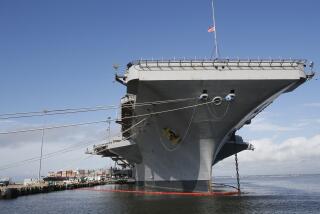Stark Capt. Reprimanded, Won’t Be Court-Martialed : Allowed to Retire at Lower Rank
WASHINGTON — The captain and weapons officer of the frigate Stark accepted responsibility today for the frigate’s failure to defend itself against an Iraqi warplane and as a result, will be allowed to leave the service with severe reprimands rather than face a court-martial, the Navy said.
Thirty-seven sailors died and 21 were injured when the Stark was struck by two Exocet missiles from the plane on the night of May 17 while on routine patrol in the Persian Gulf. Iraq called the attack a mistake, an explanation the United States accepted.
Capt. Glenn R. Brindel, the Stark’s skipper, submitted a request to retire, the Navy said in a statement. Since he has served almost 22 years, he is eligible to request retirement with a pension, the Navy added.
Because he held the rank of captain only since January, however--less than the required three years--Brindel will have to retire at the reduced rank of commander. Officials said this will mean a loss of more than $100,000 in potential retirement pay over his lifetime.
Lt. Basil E. Moncrief, 32, of Corpus Christi, Tex., the tactical action officer, has served only about eight years in the Navy. He submitted a letter of resignation “and will be separated by the Navy,” forfeiting his naval career without any opportunity to obtain a pension, the service said.
Letters of Reprimand
The decisions of the two men were announced today shortly after Adm. Frank B. Kelso, the commander in chief of the U.S. Atlantic Fleet in Norfolk, Va., issued letters of reprimand censuring them for their performance aboard the Stark two months ago.
The Navy said the Stark’s executive officer, or No. 2 in command, Lt. Cmdr. Raymond J. Gajan, 35, of Rockville, Md., “has been referred (for) disciplinary action to the commander, Naval Surface Force, Atlantic Fleet.”
That means that Kelso determined that Gajan was less culpable than the other two officers and thus decided to delegate review of his case to a lower level in the chain of command, officials said.
Kelso conducted an admiral’s mast--a non-judicial hearing--after a Navy review of the informal investigation, which had recommended that Brindel and Moncrief be court-martialed. Both were charged with dereliction of duty relating to the readiness of the ship.
The Pentagon has said the attack occurred without the Stark’s taking any defensive action. And according to Pentagon sources, that failure became a key focus of the military inquiry.
Mitigating Factors
The Atlantic Fleet said Kelso’s decision against a court-martial was based on the following factors:
--”The direct cause of the loss of life, injuries and damage inflicted on the Stark was the unprovoked and indiscriminate attack by the Iraqi F-1 aircraft.”
--”The state of battle readiness and response to the evolving attack--now determined to be unsatisfactory--caused Stark to be vulnerable; but the attack was unexpected and originated from a source considered not likely to act in a manner hostile to a U.S. naval vessel in lawful and peaceful operations in international waters.”
“Actions of Stark personnel under the leadership of Capt. Brindel and Lt. Moncrief and their respective efforts in saving Stark and preventing further loss of life were extraordinary and heroic in the face of extreme personal peril,” the fleet’s statement said.
Brindel was replaced June 23 by Cmdr. John B. Noll, 39, of East Orange, N.J., who had been tapped months earlier to replace Brindel as the next captain of the Stark in a routine change of command.
Gajan and Moncrief, who were also relieved of their posts, were awarded the Navy and Marine Corps Medal for heroism for their roles in directing firefighting efforts that saved the Stark from sinking.
More to Read
Sign up for Essential California
The most important California stories and recommendations in your inbox every morning.
You may occasionally receive promotional content from the Los Angeles Times.










